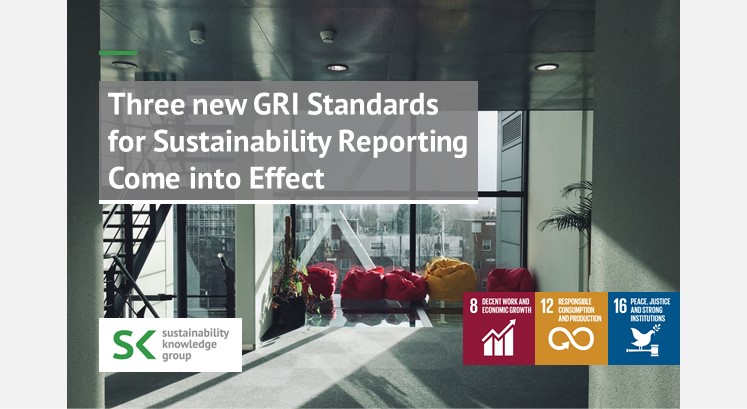Global Reporting Initiative (GRI) is an independent, international organization that helps businesses and other organizations take responsibility for their impacts, by providing them with the global common language to communicate those impacts. GRI Standards are the most widely used standards in the world for sustainability reporting.
Under the Global Sustainability Standards Board (GSSB) supervision, which is the independent body within GRI’s governance with sole responsibility for standard-setting, three new disclosure standards have been developed and now come into effect.
In 2018, the GRI updated two standards, the GRI 303: Water and Effluents 2018 and the GRI 403: Occupational Health and Safety 2018. In December 2019, the GRI 207: Tax 2019 was published, the first global reporting standard for tax transparency, Effective January 1, 2021, companies that identify any of these topics as material must adhere to the three updated and new standards in their sustainability reporting.
According to Bastian Buck, GRI Chief of Standards: “The GRI Standards seek to enable companies to communicate the full range of their impacts on the economy, the environment and society. That is why they are regularly reviewed, with content updated and the addition of new topics considered.” These three standards will help organizations and companies respond to the emerging demands of their stakeholders. They will highlight the contributions of companies to critical issues and advance sustainable development.
The new standards
GRI 303: Water and Effluents 2018
Water is an essential component in the life of all living things. The GRI 303 standard aims to assist companies and organizations in assessing their impacts on water resources, which will achieve a deep understanding of water optimization and effective management. The updated standard considers how water is managed, and the discharge-related impacts on local communities.
Management approach disclosures:
- Disclosure 303-1 Interactions with water as a shared resource
- Disclosure 303-2 Management of water discharge-related impacts
Topic-specific disclosures:
- Disclosure 303-3 Water withdrawal.
- Disclosure 303-4 Water discharge.
- Disclosure 303-5 Water consumption.
GRI 403: Occupational Health and Safety 2018
Healthy and safe working conditions are a human and they are also one of the sustainable development goals (SDGs). The standard has been updated to ensure compliance with internationally agreed best practices, which reflects recent developments in occupational health and safety management and reporting. This revised standard focuses on the safety and well-being of employees, and addresses reporting on:
Management approach disclosures:
- Disclosure 403-1 Occupational health and safety management system.
- Disclosure 403-2 Hazard identification, risk assessment, and incident investigation.
- Disclosure 403-3 Occupational health services.
- Disclosure 403-4 Worker participation, consultation, and communication on occupational health and safety.
- Disclosure 403-5 Worker training on occupational health and safety
- Disclosure 403-6 Promotion of worker health.
- Disclosure 403-7 Prevention and mitigation of occupational health and safety impacts directly linked by business relationships.
Topic-specific disclosures:
- Disclosure 403-8 Workers covered by an occupational health and safety management system.
- Disclosure 403-9 Work-related injuries.
- Disclosure 403-10 Work-related ill health.
Taxes are an important source of government revenue and countries’ macroeconomic stability. According to the United Nations, taxes play an important role in achieving SDGs. They reflect and enhance community institutions’ contribution as part of the impact of sustainability, strategy, and performance.
GRI 207: Tax 2019 is the first global reporting standard for tax transparency, and this standard was developed in response to the information needs of investors, civil society, business organizations and others.
The standard helps organizations and companies understand and communicate information about their tax practices (their revenues, taxes, and business activities on a country-by-country basis). The standard also supports transparency about the tax contribution that companies make to the economies in which they operate.
This new Standard includes disclosures on the management approach and topic-specific disclosures. These are set out in the Standard as follows:
Management approach disclosures:
- Disclosure 207-1 Approach to tax.
- Disclosure 207-2 Tax governance, control, and risk management.
- Disclosure 207-3 Stakeholder engagement and management of concerns related to tax.
Topic-specific disclosures:
- Disclosure 207-4 Country-by-country reporting.
To keep the GRI standards relevant and up-to-date, the GSSB reviews existing GRI standards and develops new standards every three years. The standards are developed based on the experience and perspectives of a multi-stakeholder group on sustainability reporting. From tax transparency to employee welfare and water stewardship, these three standards will now be in effect for many organizations and companies. The new standards will enable organizations and companies to communicate better sustainability impacts, which will lead to them preparing effective reports on how they contribute to sustainable development.
You can view and access the updated GRI standards here: https://www.globalreporting.org/standards/download-the-standards/
Photo by Nicole Baster on Unsplash


